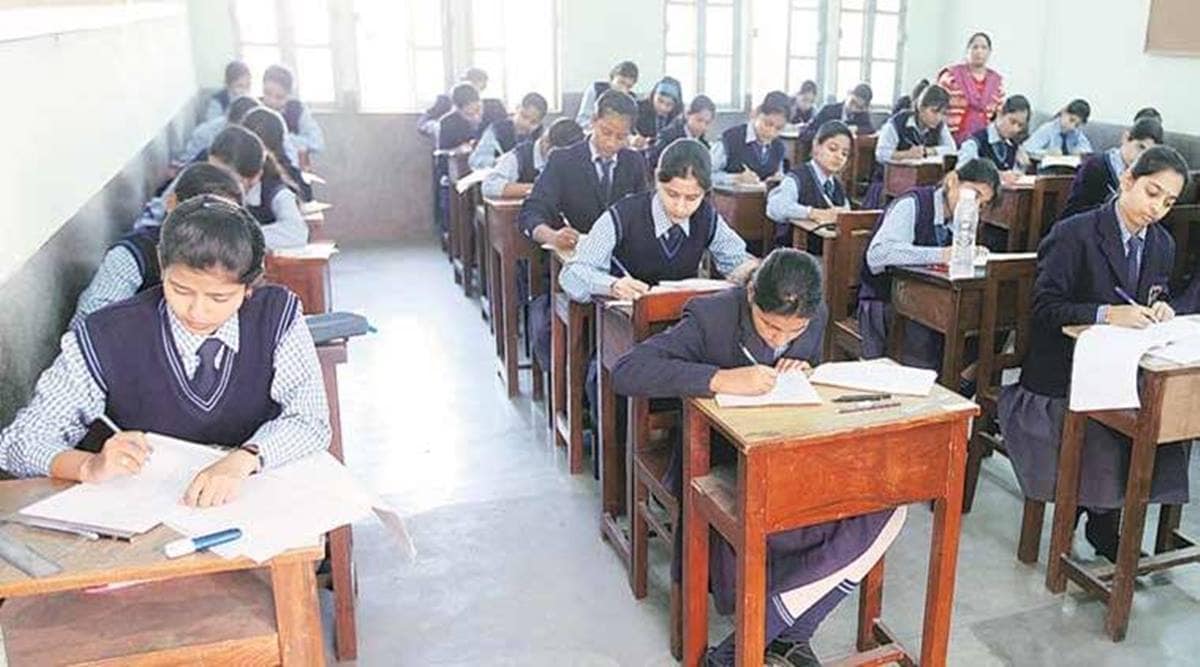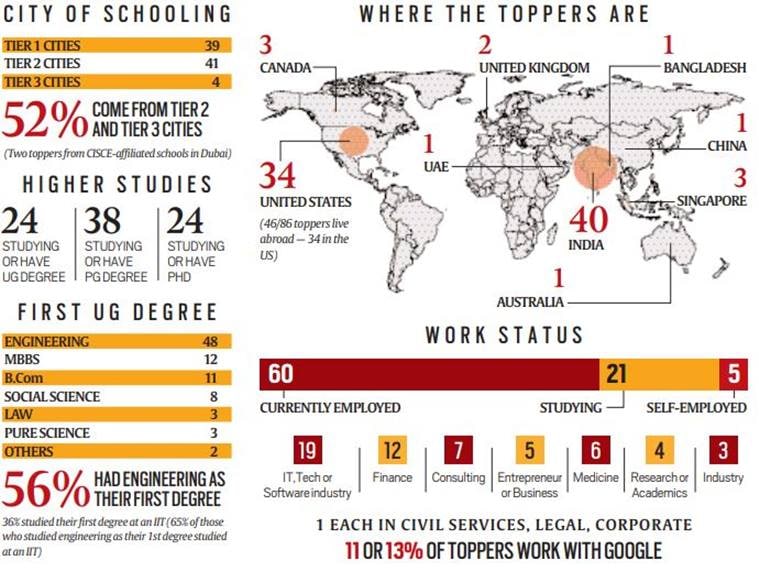Gender gap; students increasingly from outside metros; US most favoured destination, IIT popular route; minorities, SC/STs invisible: 86 CBSE, ICSE, ISC toppers 1996-2015 tell stories of change — and point to challenges as the new National Education Policy rolls out.
They are India’s national school board toppers over 20 years. So it’s no surprise that one’s a cancer physician in New York; another is a PhD fellow at MIT; one is a Harvard professor; one a hedge fund manager in Singapore — and as many as 11 are working for Google.
Each is a story of individual talent and effort, excellence and achievement, outliers all. But taken together, as an investigation by The Indian Express reveals, the arcs of their different lives — and careers — tell significant stories of a generation coming of age after India opened up in the 1990s. Of how some aspirations endure, some don’t; how some divides have crumbled, some remain as intractable as ever.
ALSO READ | Who’s who — and where
More than half the toppers live overseas today, the US being the destination of choice. Most are in science and technology with IITs their most favoured undergraduate pit-stop; more than half of them grew up outside metros, in Tier 2 and Tier 3 cities, and only one is a minority — there’s not one Dalit or tribal. And if you are a girl topper, you are much less likely to move overseas than if you were a boy.
These are among the key findings of the four-month investigation by The Indian Express that tracked down 86 men and women who stood first in India, between 1996 and 2015, in their Class 10 and 12 exams conducted by the Central Board of Secondary Education (CBSE) and the Council for the Indian School Certificate Examinations.
Amid soaring cut-off marks based on Class 12 Board exams, as the government, in tune with its new National Education Policy, sets up a panel to explore a national test to rejig the college admission process, the findings from the investigation are pointers to the challenges ahead.
Over half the toppers live or work abroad
More than half the toppers — between 21 and 42 years of age — are in foreign countries, most of them are employed, a quarter of them are pursuing advanced degrees. Three of every four who are abroad are in the United States. While the US remains the preferred destination, others are based in the UK, Australia, Singapore, China, Canada, Bangladesh and the UAE.
Of those employed abroad, most work in the tech sector, followed by medicine and finance.
Four out of 10 working in the US are in Silicon Valley. Like Biswanath Panda, who graduated from Little Flower School in Jamshedpur in 1999 and is now senior director of engineering at Google in San Francisco. Indeed, Google is home to 11 toppers, the most in any one company.
Karuna Ganesh, 37, left the country soon after topping her Class 10 ICSE exam in 1999 to join United World College (UWC), USA, an international boarding school that brings together 200 students from 80 countries. She is now a physician-scientist at the Memorial Sloan Kettering Cancer Center in New York.
“My parents were supportive about my moving abroad since UWC has a strong track record of sending students to top universities around the world, in addition to the global, multicultural education it provides,” said Ganesh, who subsequently earned a BA in Biochemistry, MA in Medicine, PhD in Molecular Biology and MD from Cambridge University.
Most went abroad to study citing better ecosystem
Higher education is the primary reason why toppers left the country. Of those living abroad, over 70% left India to pursue either their undergraduate or postgraduate studies — only a dozen of the 86 went to take up a job.
For example, Somnath Bose, 40, left India in 2008 with an MBBS from Calcutta Medical College and an MD from AIIMS, to pursue training in critical care. Today, he is an assistant professor at Boston’s Harvard Medical School and staff anesthesiologist at its teaching hospital, Beth Israel Deaconess Medical Center.
Bose says that when he left India, programmes in critical care were just starting to open up. “The US… had well-established clinical training pathways in that field, plus afforded opportunities to mix clinical work with focus on research,” he said.
Janaki Sheth, 28, who studied at a school in Thane and aced the Class 10 ICSE exams in 2008 with 98.6%, has a BTech in Engineering Physics from IIT Bombay. In 2014, she left for the US for a PhD in Physics at the University of California, Los Angeles. On why she decided to study abroad, Sheth, now a postdoctoral scholar at the University of Pennsylvania, said, “Six to seven years ago, scientific research was not very well-funded in India. So while I had some invaluable experiences at IIT, it was not sufficient for a PhD. In the US, science gets a great policy thrust which means there are more places to do good work, and there is constant upgradation of technology,” she said.
For Arkya Chatterjee, 24, who topped the Class 12 ISC exam in 2015 from a Kolkata school before graduating from IIT-Bombay in Engineering Physics, the move to the US revealed a different side to the teacher-student equation. “(There is) more honesty about collaborations — professors encourage students to talk to each other and work on homework together. This reduces the incentive for academic dishonesty. This kind of trust was mostly absent at my undergraduate institute back in India,” said Chatterjee, who is now enrolled as a PhD student at MIT.
More than half the toppers (48 out of 86) chose engineering as their undergraduate degree — only 12 did medicine. Among those who studied engineering, six out of 10 did so at an IIT.
Many, however, confessed that an interest in engineering wasn’t always the motivation behind the decision.
Sundaresh Nageswaran, 32, who topped the CBSE Class 10 exam in 2004 before studying Mechanical Engineering at IIT-Roorkee, said it was the “societal norm” for those who did well in school to study engineering. “Engineering, or more specifically IIT, was the rule… I later realised I wasn’t interested in engineering and moved out to other fields,” he said.
Sundresh later pursued an MBA from the Indian School of Business, Hyderabad, and until September, was general manager (business development) at Sea6 Energy, a platform that harnesses the potential of oceans. In his role there, he admits, there was no direct use for his mechanical engineering know-how. He is now working on his own venture.
To be sure, few regret their undergraduate degree in engineering. However, many wish they had exposure to other professions or career counselling at that age.
Lekshmi Vaidyeswaran, 29, who topped the CBSE Class 10 exam in 2007 with 99%, and is currently a senior product manager at ICICI Prudential Life Insurance in Mumbai, has a BTech degree in applied electronics and instrumentation from the College of Engineering Trivandrum.
“My family wanted me to go for Commerce. I insisted on engineering as any other choice was perceived as something opted by those who could not make it to engineering,” she said. “In hindsight, yes, I would have gone for Commerce and pursued Chartered Accountancy.”
Subhojit Ghosh, 29, who topped the ISC Class 12 exam from a Kolkata school in 2009 with 99.25%, has a BTech in Mechanical Engineering from IIT Kanpur.
He later did an MBA from Harvard Business School and is working as senior product manager at Amazon in Seattle. “While the IIT brand was definitely a factor, there was no family pressure… I liked math and science, and agree that I did not know much about other non-IIT options at that point, probably due to lack of career advice at a school level. But in hindsight, a better awareness on how your undergraduate degree links to various types of future career roles may have altered my decision of choosing mechanical engineering,” he said.
Those who stayed back in India
Among toppers who stayed back or returned to India after their higher studies, most have chosen a career in finance, followed by the tech sector, consulting, and business. This is unlike those settled abroad, who mostly worked in the tech sector.
For Parnil Singh, 27, the CBSE Class 10 topper of 2009 from a school in Visakhapatnam, there was little incentive to pursue postgraduate studies in management abroad since, she says, premier business schools in India offered more value for money. While she was at IIM-Calcutta, where she did her MBA, Singh was offered a job by Kearney, a global management consulting firm, and joined them in Delhi as consultant this month. “While an MBA abroad has its merits, it is too expensive. And today, India has lots of great jobs and opportunities in the private sector,” she said.
Tackling social, economic challenges
Of the 86 toppers, only one belonged to the Other Backward Class (OBC) category. None was Dalit or tribal. Of the 76 toppers who responded to this newspaper’s questionnaire, just five were first-generation college-goers.
Mohammad Ismat, 29, from Imphal, Manipur, topped the Class 12 CBSE exam in 2012. Ismat, who says his teacher S M Singh paid his Board examination fee since his family couldn’t afford it, went on to study BSc (Honours) Physics at Delhi’s St. Stephen’s College, funded by a corporate house.
A personal crisis at home meant that Ismat had to put his career aspirations on hold for almost four years after he graduated from Delhi University. This year, he started preparing for the UPSC examination. Of the 74 toppers who shared their family income with The Indian Express, only one came from the lowest earning quartile. The student, who didn’t want to be identified, said his parents earned less than Rs 1 lakh per annum when he topped the Class 12 Board exam.
Almost three-fourths said their parents earned over Rs 5 lakh annually at the time of their Board exams. The remaining reported annual family incomes of between Rs 1 lakh and Rs 5 lakh.
More than half the toppers are from Tier 2 and Tier 3 cities such as Dehradun, Dhanbad, Asansol, Jamshedpur, Trivandrum, Lucknow and Meerut — cities where English-medium ICSE and CBSE schools have ridden on the ambition and aspiration for a better future in these parts. These are also the cities hardest hit during the pandemic, compounding fears of job losses and school dropouts.
Source: Read Full Article



